I Wait Every Year For Summer, And It Is Usually Good, But It Is Never As Good As That Summer I Am Always
I wait every year for summer, and it is usually good, but it is never as good as that summer I am always waiting for.
— Martha Gellhorn, Selected Letters of Martha Gellhorn; in a letter to Hortense Flexner and Wyncie King
More Posts from Purposefullylackadaisical and Others



Trista Mateer, Honeybee
“This new focus on the more real, intimate side of girlhood has been largely rewarded by viewers and corporate partners alike. But what makes young women in particular so poised to take up this conversation, and ultimately profit from the interest of their (largely female) audience? For one, demonstrating high levels of personal and emotional intelligence is a prerequisite for being an idealized vision of a successful young woman. Many of these emerging trends in pop culture — yes, even in niche YouTube videos — indicate society’s intense interest in women developing a heightened awareness of the self. Feminist theory has long held that women practice self-surveillance (and therefore self-discipline) because of the immense pressures they face. From the expectation that girls know their specific body “type” (curvy on top! petite! pear-shaped!) to find the ideal jeans fit, to the myriad wellness and self-help circuits that focus on turning inward to find healing, to the health and diet fads that are rooted in self-diagnosis and self-treatment, girls and women are believed to find success through knowing and monitoring themselves intensely. The question is, if more and more gurus are turning inward, seemingly more interested in taking care of the self, then how do they continue to encourage other people to buy products that are largely focused on outward appearance? That’s where their established position as beauty experts comes into play. Buying products is one thing — but buying the right products signifies self-knowledge and the ability to care for oneself. Retail spending is blended with political and social freedom, something girls’ studies scholar Anita Harris calls a “linking of neoliberal ideologies about individual choice with a distorted kind of feminism.” Girls’ ability to make purchases is often seen as empowering, in its display of personal wealth amassed and its demonstration of knowing oneself best. The young women on YouTube have deftly manipulated this ethic to their advantage. There are only so many videos one can make about eyeshadow palettes or bubble bath before finding a new narrative through which to talk about them.”
— How YouTubers Like Zoella Capitalize On The Self-Care Movement (via thecrownedgoddess)
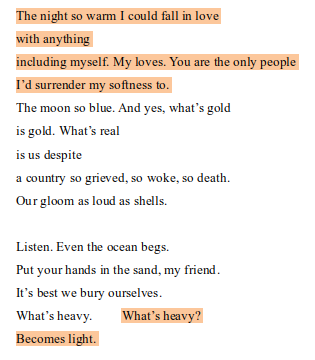






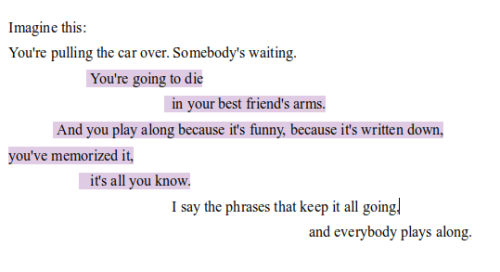












On Friendship, Falling in Love and Falling Apart, pt. 2 (pt. 1, pt. 3, pt. 4)
Ode to Friendship, Noor Hindi
The Truth Has Three Sides, Sabrina Benaim
I've Got a Dark Alley and a Bad Idea That Says You Should Shut Your Mouth (Summer Song), Fall Out Boy
Autumn, Patty Dickson Pieczka
Unknown
Unknown
Nature Poem, Chen Chen
Planet of Love, Richard Siken
Ever Yours: The Essential Letters, Vincent Van Gogh
Just Like Heaven, The Cure
Speeches for Dr. Frankenstein, Margaret Atwood
The Dialogue of Desire and Guilt, J.D. McClatchy
Someplace Like Montana, Ada Limón
Cold Solace, Anna Belle Kaufman
Fleabag (2016-2019)
Litany in Which Certain Things Are Crossed Out, Richard Siken
Your Love Finds Its Way Back, Sierra DeMulder
The Diaries of Katherine Mansfield
Moments, Mary Oliver




[ID: excerpt from The gender of sound, Anne Carson
“Putting a door on the female mouth as been an important project of patriarchal culture from antiquity to present day. Its chief tactic is an ideological association of female sound with monstrosity, disorder and death.”
poetry line by Meggie Royer @writingsforwinter
“A woman’s first blood doesn’t come from between her legs but from biting her tongue.”
excerpt from Hunger makes me, Jess Zimmerman
“The low-maintenance woman, the ideal woman, has no appetite. This is not to say that she refuses food, sex, romance, emotional effort; to refuse is petulant, which is ironically more demanding. The woman without appetite politely finishes what’s on her plate, and declines seconds. She is satisfied and satisfiable.”
excerpt from The unruly woman: Gender & the genres of laughter, Kathleen Rowe
“…voices in any culture that are not meant to be heard are perceived as loud when they do speak, regardless of their decibel level.”] 💔
male gaze is not 'when person look sexy' or 'when misogynist make film'
death of the author is not 'miku wrote this'
I don't think you have to read either essay to grasp the basic concepts
death of the author means that once a work is complete, what the author believes it to mean is irrelevant to critical analysis of what's in the text. it means when analysing the meaning of a text you prioritise reader interpretation above author intention, and that an interpretation can hold valid meaning even if it's utterly unintentional on the part of the person who created the thing. it doesn't mean 'i can ignore that the person who made this is a bigot' - it may in fact often mean 'this piece of art holds a lot of bigoted meanings that the author probably wasn't intentionally trying to convey but did anyway, and it's worth addressing that on its own terms regardless of whether the author recognises it's there.' it's important to understand because most artists are not consciously and vocally aware of all the possible meanings of their art, and because art is communal and interpretive. and because what somebody thinks they mean, what you think somebody means, and what a text is saying to you are three entirely different things and it's important to be able to tell the difference.
male gaze is a cinematographic theory on how films construct subjectivity (ie who you identify with and who you look at). it argues that film language assumes that the watcher is a (cis straight white hegemonically normative) man, and treats men as relatable subjects and women as unknowable objects - men as people with interior lives and women as things to be looked at or interacted with but not related to. this includes sexual objectification and voyeurism, but it doesn't mean 'finding a lady sexy' or 'looking with a sexual lens', it means the ways in which visual languages strip women of interiority and encourage us to understand only men as relatable people. it's important to understand this because not all related gaze theories are sexual in nature and if you can't get a grip on male gaze beyond 'sexual imagery', you're really going to struggle with concepts of white or abled or cis subjectivities.



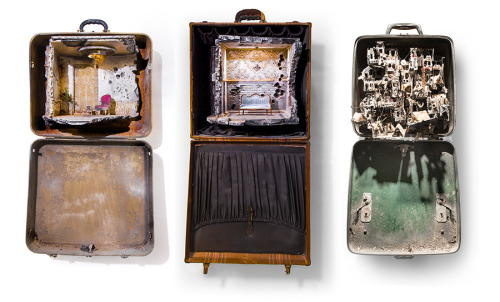




Elaine Castillo, America Is Not The Heart Jeanette Winterson, Oranges Are Not the Only Fruit Ijeoma Umebinyuo, ‘Confessions’, Questions for Ada Mohamad Hafez, Baggage series Evelyn Waugh, Brideshead Revisited Anne Carson, ‘The Glass Essay’, Glass, Irony, and God Margaret Atwood, ‘November’, You Are Happy Richard Siken, ‘Boot Theory’, Crush
“How as a girl, in cut-off jeans and a skimpy string-bikini top, I lay in the back of a pick-up truck, the better to bronze my young, bare flesh. How I wanted to scorch myself, then; how I wanted to burn my beauty onto the very eye of love. How lovely, the way we wreck ourselves on the world; how we shine in it, too.”
— Cecilia Woloch, ‘Girl in a Truck, Kentucky Highway 245’, in Narcissus (via antigonies)
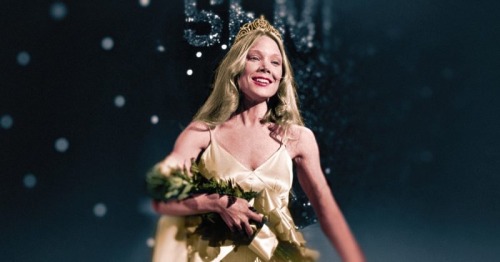

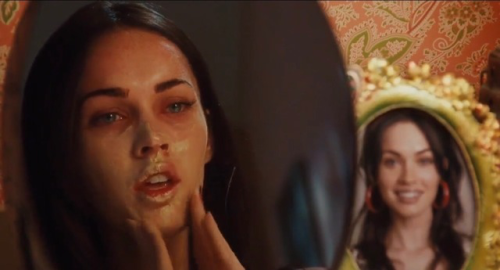
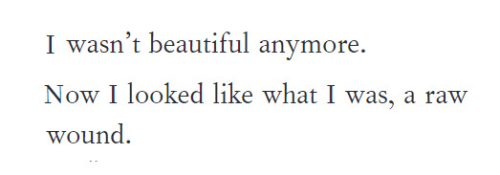
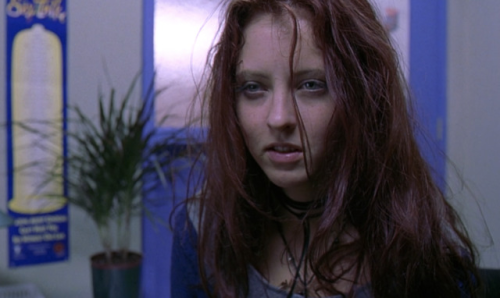

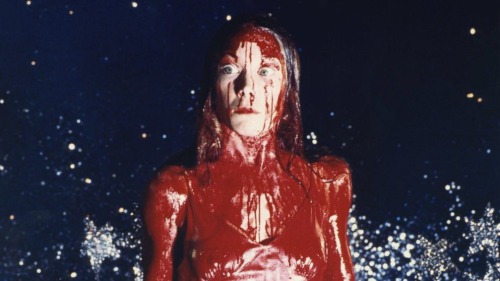
Carrie (1976) dir. Brian de Palma // Wuthering Heights -Emily Brontë // Jennifer’s Body (2009) dir. Karyn Kusama // White Oleander -Janet Fitch // Ginger Snaps (2000) dir. John Fawcett // Wolf Like Me -TV on the Radio
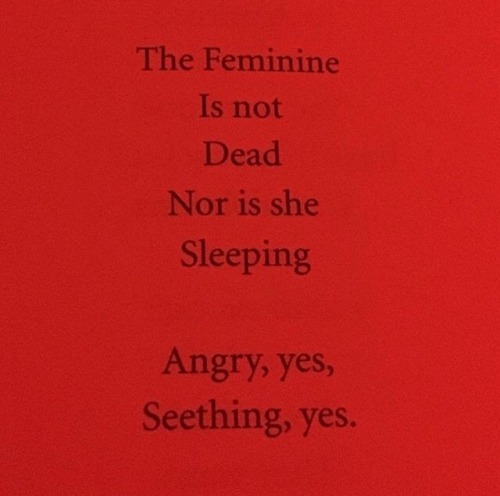
https://instagram.com/p/BJ4TOcwAJTj/
“I held my grief like two limp tulips. What am I allowed to have? I’m still here. I’m still hers. I’m still a body licked by stars.”
— “Departure” by Erika L. Sánchez (via decreation)
-
 me-u-n-hennessy liked this · 5 months ago
me-u-n-hennessy liked this · 5 months ago -
 ziyechs liked this · 10 months ago
ziyechs liked this · 10 months ago -
 malinconiacronica liked this · 10 months ago
malinconiacronica liked this · 10 months ago -
 embroidered-inkwells reblogged this · 10 months ago
embroidered-inkwells reblogged this · 10 months ago -
 delusionsof-grandeur reblogged this · 10 months ago
delusionsof-grandeur reblogged this · 10 months ago -
 kahhorri reblogged this · 10 months ago
kahhorri reblogged this · 10 months ago -
 hcbrch reblogged this · 10 months ago
hcbrch reblogged this · 10 months ago -
 sanffable liked this · 10 months ago
sanffable liked this · 10 months ago -
 gedanken-bahnhof reblogged this · 11 months ago
gedanken-bahnhof reblogged this · 11 months ago -
 aesthetics-that-love-you-back liked this · 1 year ago
aesthetics-that-love-you-back liked this · 1 year ago -
 thekidsofkalifornia liked this · 1 year ago
thekidsofkalifornia liked this · 1 year ago -
 evaaxgonzalezz reblogged this · 1 year ago
evaaxgonzalezz reblogged this · 1 year ago -
 purposefullylackadaisical reblogged this · 1 year ago
purposefullylackadaisical reblogged this · 1 year ago -
 fountainhead1085 liked this · 1 year ago
fountainhead1085 liked this · 1 year ago -
 theoceanisfreedom reblogged this · 1 year ago
theoceanisfreedom reblogged this · 1 year ago -
 theoceanisfreedom liked this · 1 year ago
theoceanisfreedom liked this · 1 year ago -
 her-madjesty liked this · 1 year ago
her-madjesty liked this · 1 year ago -
 ima-turtle reblogged this · 1 year ago
ima-turtle reblogged this · 1 year ago -
 poeticsinnamon reblogged this · 1 year ago
poeticsinnamon reblogged this · 1 year ago -
 vinca-majors reblogged this · 1 year ago
vinca-majors reblogged this · 1 year ago -
 violet-grief reblogged this · 1 year ago
violet-grief reblogged this · 1 year ago -
 cloverch reblogged this · 1 year ago
cloverch reblogged this · 1 year ago -
 fluffairy liked this · 1 year ago
fluffairy liked this · 1 year ago -
 zudummfuerduesewelt reblogged this · 1 year ago
zudummfuerduesewelt reblogged this · 1 year ago -
 gedanken-bahnhof reblogged this · 1 year ago
gedanken-bahnhof reblogged this · 1 year ago -
 sophfrancoise liked this · 1 year ago
sophfrancoise liked this · 1 year ago -
 there-is-another-skyyyyyy liked this · 1 year ago
there-is-another-skyyyyyy liked this · 1 year ago -
 agrebirth reblogged this · 2 years ago
agrebirth reblogged this · 2 years ago -
 evaaxgonzalezz reblogged this · 2 years ago
evaaxgonzalezz reblogged this · 2 years ago -
 hauntedemptymind liked this · 2 years ago
hauntedemptymind liked this · 2 years ago -
 pastel-twilights liked this · 2 years ago
pastel-twilights liked this · 2 years ago -
 this-istemporary reblogged this · 2 years ago
this-istemporary reblogged this · 2 years ago -
 gedanken-bahnhof reblogged this · 2 years ago
gedanken-bahnhof reblogged this · 2 years ago -
 interestclar reblogged this · 2 years ago
interestclar reblogged this · 2 years ago -
 artoises liked this · 2 years ago
artoises liked this · 2 years ago -
 belosers reblogged this · 2 years ago
belosers reblogged this · 2 years ago -
 untitled98221 liked this · 2 years ago
untitled98221 liked this · 2 years ago -
 damlatheteenagewitch reblogged this · 2 years ago
damlatheteenagewitch reblogged this · 2 years ago -
 femmeprincessx liked this · 2 years ago
femmeprincessx liked this · 2 years ago -
 1st-of-april liked this · 2 years ago
1st-of-april liked this · 2 years ago -
 resistinggentropy reblogged this · 2 years ago
resistinggentropy reblogged this · 2 years ago -
 evaaxgonzalezz liked this · 2 years ago
evaaxgonzalezz liked this · 2 years ago -
 miabrown007 liked this · 2 years ago
miabrown007 liked this · 2 years ago
95 posts